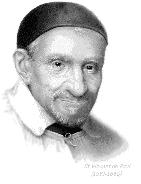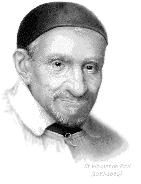 Fr. Dennis Holtschneider, President of dePaul University, offers his take on the Starting Point for Vincentian Formation.
Fr. Dennis Holtschneider, President of dePaul University, offers his take on the Starting Point for Vincentian Formation.
We represent very different lifestyles and types of ministry, so formation is going to look a bit different for each of us. But I believe there are some constants that are true for any Vincentian formation. His six points as found on VinFormation…
You serve the poor, then you do something to build up your heart.
You serve the poor, then you go back and read scripture and realize, perhaps for the first time, how much of scripture is about the poor.
You serve the poor, then you start to learn about the services that are available from various governmental and charitable agencies, and you learn how to work the system to help the poor.
You serve the poor, and then you read Vincent’s or Louise’s or Elizabeth Ann’s letters to let them strengthen your inner self and teach you something you weren’t ready to hear before you had actually met the poor.
You serve the poor, and then you spend time reflecting with others who serve the poor to learn from them and to support one another. You serve the poor, and then you pray, and read the writings of the spiritual masters, and perhaps begin to meet with a spiritual director.
You serve the poor, and then you begin to ask why it has to be this way, and then begin to read sociology, economics, social work, psychology, substance abuse, history, politics, government, housing, nutrition, health, management, spirituality, and so much more.
- Initial Comment
- A “GO-THEN” philosophy
- WE FORM EACH OTHER
- IT’S THE POOR WHO MAKE YOU A VINCENTIAN
- IT HELPS TO LEARN THE STORIES, OUR HISTORY AS VINCENTIANS
- SEE TO YOUR NEEDS FIRST
- “IT’S NOT OVER TILL IT’S OVER Theory.”
Here he reflects on the importance of learning the stories of our history….
Sooner or later, IT HELPS TO LEARN THE STORIES, OUR HISTORY AS VINCENTIANS.
When I first went to the novitiate program, that one year of intense study of Vincent DePaul and his writings and spirit, I read the three volumes of Coste’s biography of Vincent. At first thought I was spending the time to learn the history. It wasn’t until many years later that it dawned on me that I wasn’t being taught these stories to know them; I was being taught them to be inserted into them. The story of Vincent’s service to the poor and the service to the poor from all those who have followed in his footsteps since that time, was now to include me as part of the story.
The purpose of reading about our founders and our histories is not to assemble interesting information, it is to insert ourselves into the story, and to absorb the values and the lessons about serving the poor that they had learned along the way and wanted to pass on to us. There’s a lot of wisdom that Vincent DePaul and our respective founders wanted us to take in, and a lot of mistakes they wanted us to avoid. That’s really helpful. But when we read Elizabeth Ann’s life, or Louise’ correspondence, or the wisdom of Frederic Ozanam, it’s important to see them as flesh-and-blood real human beings. Not some idealized figures in an idealized history.
Vincent and his contemporaries had to figure it out on their own. They didn’t have a model to copy. Those who came after Vincent had to figure it out on their own too, because the world changed and they had to figure out how to serve the poor in their times and countries. We study the past not to copy, but to take heart from it, and to bring the values and purposes forward into a new time and place. We too have to figure it out for this time and place, but we are now part of the story. That’s what Vincent understood. He was continuing the love of Christ for the poor, and wanted us to do the same. We are continuing the Lord’s and Vincent’s service. We are part of the story now. Someday, they’ll study what we did in our time. We’ll be part of this history.
Tags: formation, Holtschneider, Vincentian

